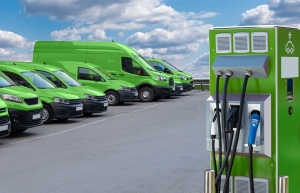Potential is substantial for the electric vehicle industry
They have aggressively supported the industry’s growth by introducing policies like tax incentives for home manufacture, imported autos, and infrastructure spending. Foreign carmakers still dominate the market share. Still, local brands are continuously exploring innovative features to enhance connectivity within vehicles with government support and investment in research and development.
 |
| Le Khanh Lam, partner, RSM Vietnam |
With several local and international carmakers preparing to introduce electric vehicle (EV) models in the upcoming years, the segment will be a significant growth driver in the market. While opportunities are virtually limitless, local brands must proactively prepare and strategise to ensure the industry thrives.
The government has plans to support the use of renewable energy sources and invest in the development of EVs, which may open up new business opportunities for the sector. According to German online platform Statista, EVs in Vietnam will experience significant growth in the coming years.
By 2028, experts predict there will be one million EVs on the roads. By 2040, this number is estimated to soar to 3.5 million. As a result of this, other supporting industries will benefit, including infrastructure, charging solutions, ancillary EV services like tyres and spare parts, and demand for high-tech machinery.
Hence, Vietnam’s EV industry offers a promising landscape for businesses to collaborate and seize incredible opportunities. By forming strategic partnerships, companies can tap into this emerging market and capitalise on its potential for growth and success.
EVs are showing promising potential in Vietnam, but still face many challenges. Cost is critical in terms of EVs achieving parity with internal combustion vehicles. To thrive, manufacturers and suppliers need to strike a balance between profitability and affordability when it comes to these vehicles.
Moreover, the global adoption of EVs has skyrocketed due to the growing concern for environmental sustainability. The energy consumption is another challenge beyond consumer acceptance. Overnight charging at home by many people will increase electricity usage, resulting in a heavy burden on electricity suppliers to meet the demand.
 |
| Increased investment is a prerequisite to ensure rapid growth of the industry. Source: Shutterstock |
One significant challenge users face is the need for charging stations. This issue is further compounded in Vietnam by inadequate power grid capacity and the absence of standardised charging protocols. Consequently, businesses face operational challenges.
Recruiting skilled professionals in Vietnam may be challenging because few educational institutions have training courses in this area. In addition, technological advances require continuous training and upskilling of existing employees.
Embracing EVs comes with many advantages, and collaboration is a crucial factor in ensuring the success of this transition. Achieving success in the industry requires coordinated efforts from various key players, such as governments, investors, energy providers, and entrepreneurs.
Significant investments are needed to support the rapid growth of the market, especially in infrastructure development. Building charging stations and upgrading power grids are part of this process.
Integrating charging stations into existing gas stations improves convenience for car owners and uses existing infrastructure, bringing benefits to both emerging and traditional businesses within the automotive industry. Investing in charging stations should be done before expecting the EV to be popular. State-owned, private, and foreign-owned companies can invest in developing charging stations.
To succeed in the Vietnamese market, brands should educate consumers about EVs. Brands gain long-term benefits by capturing early adopters, building trust, and establishing a solid foothold. To effectively cater to customers, it is crucial for companies to understand and address their pain points.
Additionally, customising electric vehicle models to suit local needs is essential in gaining market acceptance. Moreover, maintaining authenticity in sustainability messaging helps establish trust with environmentally conscious consumers.
Meanwhile, the integration of AI into the automotive sector has led to a wave of advancements. AI is capable of identifying and correcting mistakes in design models. Machine learning algorithms can identify defects with high accuracy. It ensures only high-quality products reach the assembly line by flagging faulty parts.
Furthermore, AI-powered predictive maintenance systems have significantly improved vehicle reliability. By analysing data from various sensors embedded within a vehicle’s components, these systems can detect potential issues before they become significant problems. This reduces downtime and also saves costs associated with unexpected repairs.
 | Electric vehicle subsidies underpin green transport shift Different initiatives for subsidising electric vehicle (EV) sales are expected to promote the shift to green transportation in Vietnam. |
 | EV battery infrastructure gains interest from suppliers High demand and the work of VinFast and VinES are helping to ensure Vietnam becomes a regional battery manufacturing hub for electric vehicles. |
 | Supportive policies needed for EV charging infrastructure While the demand seems to be rising in Southeast Asia for electric vehicles, the development of charging station infrastructure is still too slow and supportive policies are still required. |
 | Net-zero through electrifying Vietnam’s commercial transport The electric vehicle revolution is taking the world by storm, and Vietnam has found itself in the middle of it. Arthur Do, CEO of Pioneer Marketing and Public Affairs, explains how managing the shift in the right way could help the country fulfill its net-zero commitments more efficiently. |
What the stars mean:
★ Poor ★ ★ Promising ★★★ Good ★★★★ Very good ★★★★★ Exceptional
Related Contents
Latest News
More News
- Implementation of the circular economy in Vietnam (November 13, 2023 | 11:30)
- Banking’s development in data and digitalisation era (November 07, 2023 | 15:24)
- ESG enabling real estate businesses to attain funds (June 16, 2023 | 15:25)
- RSM Vietnam stays ahead of the changing business environment (March 14, 2023 | 10:07)
- What might the Vietnamese economy look like in 2023? (January 02, 2023 | 21:37)
- Neobanking: a trend-setting model for the digital revolution (December 19, 2022 | 14:30)
- Evaluating the prospects of M&A upswings next year (November 28, 2022 | 08:00)
- RSM Vietnam celebrates opening new office in Ho Chi Minh City (September 20, 2022 | 19:29)
- RSM Vietnam taking advantage of central region recovery to expand operations (September 19, 2022 | 08:00)
- Firm grasp of rules crucial in handling customer info (August 29, 2022 | 08:00)

 Tag:
Tag:















 Mobile Version
Mobile Version